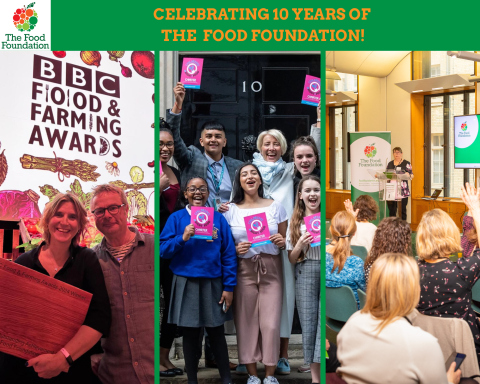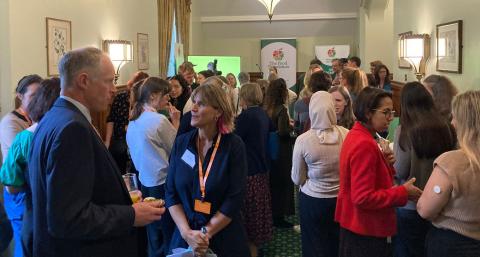Nourishing the Nation
Food is a huge part of all of our lives, nourishing and fuelling us. It impacts our health, happiness and overall prosperity. But the current food system is holding our nation back.
Because it is so difficult to eat healthily, poor diet is now the biggest risk for preventable disease, placing massive strain on our NHS.
Prior to the election we called on all political parties and candidates to commit to making healthy, sustainable food available and affordable for everyone.
Now the newly-elected MPs have been sworn in we've produced an introductory guide to the food system, explaining how it is failing us and why it matters to help policymakers navigate the complex challenges they are grappling with.
It is relevant to anyone concerned about the health service, the economy, climate change, education, children, communities or inequalities and aims to show parliamentarians how they can contribute to a policy agenda that will deliver tangle benefits to their constituents.
Read the five key areas for change in our Manifesto below
1) Make healthy and sustainable food affordable
For many households, buying healthy and sustainable food is not currently affordable.
Healthier options for instance cost more than twice as much per calorie compared to less healthy options and are often either not available or less convenient, while the most deprived in society need to spend up to 50% of their disposable income on food just to meet the cost of the Government recommended healthy diet.
We need to rebalance food prices so healthy foods are the least expensive and give households the resources they need so that no one is ever forced to choose between eating cheaply and eating well.
We call on political parties to:
- Build on the success of the Soft Drinks Industry Levy by developing new fiscal policies that encourage businesses to reformulate other food and drink categories and rebalance the cost of more healthy and less healthy foods. Invest the revenue raised from existing and new levies into policies which target low-income households and help make healthy foods more affordable and accessible.
- Remove VAT from healthier and sustainable meals sold in restaurants and fast-food outlets
- Require the cost of healthy and sustainable diets be taken into account when setting benefits levels and the minimum wage.

2) Stop the junk food cycle
Less healthy food has crept into all parts of our daily life, including in our shops, our homes and on the high street.
Advertisements for unhealthy foods are all around us, whether it be online or TV, at bus stops and on high street billboards and whole supermarket aisles dedicated to confectionery and unhealthy snacks.
A third of advertising spend on food and drink goes towards confectionary, snacks, desserts and soft drinks compared to just 1% on fruit and vegetables.
The packaging of many unhealthy foods has claims which create a health halo. This now feels normal, but this environment makes it increasingly difficult for us to make healthy choices.
Foods that were once eaten occasionally now make up a large proportion of what we eat, leading to diet-related disease and unsustainable pressure on the NHS.
We call on political parties to:
- Press forward with existing commitments to restrict unhealthy food advertising on TV and online, and to restrict multibuy offers on unhealthy food. In addition, act to reduce unhealthy food and drink advertising in outdoor areas.
- Support local authorities to enact their powers to improve local food environments by using planning rules to reduce the number of unhealthy fast food outlets and restrict local advertising of unhealthy food, and by supporting the establishment of cross-sectoral food partnerships in every local area to help create a more healthy, sustainable and fair local food system.
- Invest in advertising for healthy and sustainable foods (particularly healthy options like fruit, vegetables and pulses) to drive aspiration and to normalise consumption, building on the work of initiatives like Veg Power.

3) Invest in children's diets
Children are the future, but their diets are not setting them up well for a productive, healthy life. Many are experiencing food insecurity and the most deprived children in society have higher risks of obesity and dental decay, and are on average shorter than the least deprived children. Improving access to nutritious food for all children is essential if they are to achieve their full potential – improving their health, their educational outcomes and their future economic prospects. Every child has the right to a healthy diet, no matter where they were born.
We call on political parties to:
- Provide Free School Meals to all children starting by increasing the eligibility criteria to all children in families in receipt of Universal Credit, and auto-enrolling all eligible children with the goal of providing Universal Free School Meals.
- Expand eligibility, improve uptake and increase the value of Healthy Start (in England, Northern Ireland and Wales) and Best Start Foods (in Scotland), and make the extension of Healthy Start to children with no recourse to public funds permanent.
- Increase the volume of fruit and vegetables served at snack times and mealtimes in schools and expand the School Fruit and Vegetable Scheme so that all primary school children can benefit.

4) Make it easier to eat sustainably
Meeting the UK’s net zero targets will be impossible if we don’t reduce greenhouse gas emissions from the food system.
This means changing both how we produce our food, as well as what we eat such as less meat and dairy.
Currently, even the money that the government spends directly on buying food doesn’t deliver for our health or the health of our environment.
We must make sustainable food that is good for both people and planet the easiest and most affordable option for everyone.
We call on political parties to:
- Strengthen government procurement rules for public institutions where food is served, as well as School Food Standards, by making health, sustainability and environmental standards mandatory and retaining greater economic value in local areas through local purchasing.
- Commit to an ambitious horticulture growth plan for British farmers in each of the devolved nations for an expanded, vibrant, and thriving horticulture sector which can support the production and increased consumption of minimally processed alternatives to meat, such as vegetables and legumes and ensure the UK is not unsustainably reliant on imports.
- Update the Eatwell Guide with a greater focus on sustainability to help inform decisions about what a more sustainable, healthy diet looks like.

5) Unleash the full potential of the food system
There are opportunities for government to use the levers at its disposal to set a clear direction of travel for transformative change in the food system.
Without this, the risks and opposing commercial pressures that the food industry faces are too great to deliver change at the necessary pace.
We call on political parties to:
- Commit to a new food bill for England to provide a governance structure for food policy and the means of delivering clear action across the food system. This should set a series of targets which articulate the long-term outcomes we expect of the food system for our health, environment and economy, and establish a process for monitoring progress, enabling cross government policy coherence and ensuring accountability.
- Improve transparency by introducing mandatory public reporting by food businesses against a range of health and sustainability metrics to de-risk business investment in more healthy and sustainable food offerings (delivering the promises of the Food Data Transparency Partnership).
- Invest and support innovation and R&D across the food industry and help businesses to take healthy and sustainable food innovations to scale.
A more nourishing and more sustainable food system can underpin a healthy and prosperous society, but it needs bold policies and policymakers to make it happen. It’s time for visionary leaders to make this a reality.

10 Cost Free Policies
Following July's General Election the first 100 days of the new government will present a unique opportunity to implement new policies and immediate actions aimed at nourishing our nation.
Our report outlines a set of measures that require limited financial resources and, in most cases, have been recommended by Government advisory boards or selected committees.
Manifesto Briefings










